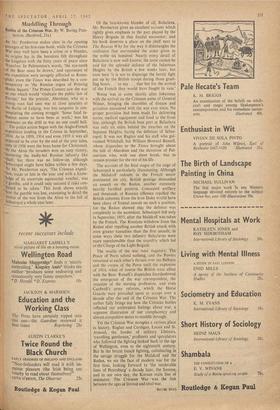Muddling Through
Battles of the Crimean War. By W. Baring Pem- berton. (Batsford, 21s.) As Mr. Pemberton makes clear in the opening passages of his first-rate book, while the Crimean War may well have been a crime or a blunder, its origins lay in the boredom felt throughout the kingdom with the forty years of peace since Waterloo. In Palmerston's words, 'the eye-tooth of the Bear must be drawn,' and opponents of the expedition were savagely pilloried as Russo- ' phile; even the Times was described by a con- temporary as 'the Russian organ of Printing House Square.' The Prince Consort saw the war as one which would 'vindicate the public law of Europe,' but the premier, Aberdeen, who as a Young man had seen war at close quarters at the Battle of Leipzig, was less sanguine in con- templating the coming struggle. 'Some fatal in- fluence seems to have been at work,' was his comment on the drift to war no one could halt.
The police action began with the Anglo-French expedition landing in the Crimea in September, 1854. As in 1899, 1914 and even 1939 it was all expected to be over by the end of the year (alas, only in 1956 were the boys home for Christmas). At the Alma the invaders won an easy victory, scattering the badly-led Russian infantry like 'ehalr; but there was no follow-up, although 'Sebastopol might have fallen within a few days.
• ,1
srk, s Mr. Pemberton says, 'The Crimean expedi- t-tion, made so late in the year and with a know-
ledge
St, of its uncertain equinoctial weather, was ji gamble, and it could only succeed if risks con- 1linued to be taken.' This book shows exactly how the gamble was lost, examining in detail the Course of the war from the Alma to the fall of 4Slebastopol a whole year later. Of the best-known blunder of all, Balaclava, Mr. Pemberton gives an excellent account which rightly gives emphasis to the part played by the Heavy Brigade in that fateful encounter; and his book deserves a place on the shelf next to The Reason Why for the way it dis'entangles the confusion that surrounded the order given to the noble six hundred. Nearly every detail of Balaclava is now well known; the same cannot be said for the splendid defence of the Inkerman Heights by the British a few weeks later, but even here 'it is not to disparage the heroic fight put up by the British troops during those gruel- ling hours . . . to say . . . that but for the arrival of the French they would have fought in vain.'
Worse was to come shortly after Inkerman with the arrival on the Crimean scene of General Winter, bringing the shambles of disease and privation associated with the war ever since. No proper provision had been made for delivering stores, medical equipment and food to the front line, although the British base port at Balaclava was only six miles behind the trenches on the Sapoune Heights, facing the defences of Sebas- topol. It was not Raglan and his staff who gal- vanised Whitehall, but William Howard Russell, whose dispatches to the Times brought about the fall of Aberdeen and the elevation of Pal- merston who, with one short break, was to remain premier for the rest of his life.
The account of the final stages of the siege of Sebastopol is particularly illuminating. Although the Malakoff redoubt in the French sector dominated the city, British prestige demanded an assault on the Redan, another extremely heavily fortified position. Concealed artillery and thousands of Russian riflemen repelled the British columns. Even the Iron Duke would have been chary of frontal assault on such a position, for the Redan showed that the defence was completely in the ascendant. Sebastopol fell only in September, 1855, after the Malakoff was taken by the French. The Russians withdrew from the Redan after repelling another British attack with even greater casualties than the first assault; in some ways these two infantry Balaclavas were more reprehensible than the stupidity which led to the Charge of the Light Brigade.
The results of the war were nugatory. The Peace of Paris solved nothing, and the Powers remained at each other's throats over the Balkans and the corpse of the Porte until the explosion of 1914, when of course the British were allied with the Bear. Russell's dispatches foreshadowed the emergence of the war correspondent, the creation of the nursing profession, and even Cardwell's army reforms, which the Horse Guards were prevailed upon to accept over a decade after the end of the Crimean War. The author fully brings out how the Crimean battles reflected our ambivalent feelings about war, a supreme illustration of our complacency and almost compulsive desire to muddle through.
Yet the Crimean War occupies a curious place in history. Raglan and Cardigan, Lucan and St. Arnaud, the hordes of military kibitzers, 'travelling gentlemen,' profiteers and speculators who followed the fighting looked back to the age of Wellington, even to the eighteenth century. But in the brutal trench fighting, culminating in the savage struggle for the Malakoff and the Redan, we see the face of modern war for the first time, looking forward to 'the intolerable lines of Petersburg' a decade later, the Somme, and in our own day, the Korean main line of resistance. The Crimean War was the link between the ages of limited and total war.
DAVID REES














































 Previous page
Previous page